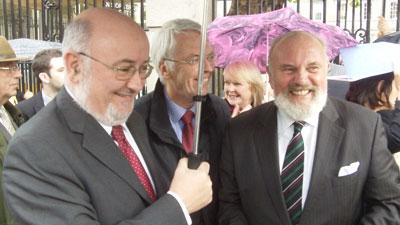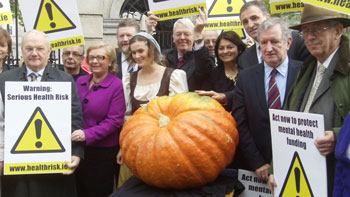Dire state of mental health highlighted by calls to protect funding

Mental health is allocated 5.3% of the total health budget, 3% less than the minimum 8.24% recommended in the policy document 'A Vision for Change'. Cross-political and cross-societal groups met yesterday to call on government to protect Mental Health from further cuts. By Eamonn Costello
Campaigners gathered outside Leinster House yesterday in an effort to protect the mental health budget, described as the “Cinderella” of the health services.
In an open letter delivered to the Dail, the Government was called on to protect the mental health budget from further cuts in Budget 2011. Leading mental health organisations, support groups, trade unions and politicians from all parties supported the letter. Senator David Norris, Caoimhin O'Caolain of Sinn Fein and Fr. Peter McVerry SJ, as well as economic commentators Eddie Hobbs and Jim Power are among the signatories.
“The open letter highlights the crisis Ireland's mental health services has reached, warning that any further cuts must come with a serious health warning," said Orla Barry, Director of the Irish Mental Health Coalition.
“Our position is that the mental health budget has already taken significant cuts. The funding in Mental Health is already at an all time low. If you look at what has happened with the Public Service moratorium, within the HSE half of the staff that are gone - and therefore half of the funding that has gone - is mental health staffing. Yet they only represent nine percent of the workforce. We are really concerned that if there are any further cuts to Mental Health, then the services will be in serious danger.”
Mental health services in Ireland was given a fresh direction in 2006, with the publication of the strategy document, A Vision for Change. It describes a framework for building and fostering positive mental health across the entire community and for providing accessible, community-based, specialist services for people with mental illness. It recommends that the total spend on mental health should be at least 8.24% of health spending. Demand for mental health services increases in a recession, but between 2006 and 2009, funding for mental health was cut by 10%. The effect of this has already become apparent, with waiting lists for children and adolescents growing by 14%. And tragically, the number of people who ended their lives grew substantially in the past year. In 2008, 427 people died by suicide. During 2009 this figure rose by 100 to 527. Misister for Health Mary Harney TD acknowleged, "There has to be a strong link between our economic circumstances and suicide"
and for providing accessible, community-based, specialist services for people with mental illness. It recommends that the total spend on mental health should be at least 8.24% of health spending. Demand for mental health services increases in a recession, but between 2006 and 2009, funding for mental health was cut by 10%. The effect of this has already become apparent, with waiting lists for children and adolescents growing by 14%. And tragically, the number of people who ended their lives grew substantially in the past year. In 2008, 427 people died by suicide. During 2009 this figure rose by 100 to 527. Misister for Health Mary Harney TD acknowleged, "There has to be a strong link between our economic circumstances and suicide"
Limerick City Labour T.D. and Party Spokesperson on Health Jan O'Sullivan also voiced her concerns.
“I feel very strongly that we need to defend the Mental Health Budget. Its gone right down to 5.3% of the total health spend, which is the lowest its ever been. The Vision for Change initiative has recommended that it should be at least 8 percent”, she said.
“We have argued very strongly that we need to protect the most vulnerable, and certainly people with mental health issues are very vulnerable, particularly as the Mental Health budget has already been cut significantly.”
She said that the plan is that to create more services in the community, and that there would be less dependency on the old style mental health hospitals.“In fact what we have had is the cuts, but we haven't had the development of the community services. The community mental health teams and the child and adolescent mental health teams are not at all adequate. If there are further cutbacks, I think it will be primarily be community services, that will be stripped of resources, and at the same time the remaining beds in the acute hospitals will also be short of staff.”
